- Switzerland is hosting world leaders this weekend to discuss peace in Ukraine without Russia’s participation.
- Ukrainian President Volodymyr Zelenskyy’s government excluded Russia from the talks, and Switzerland did not invite them.
- The conference is based on Zelenskyy’s 10-point peace plan from late 2022, aiming to rally international support.
Switzerland will host scores of world leaders this weekend to try to map out first steps toward peace in Ukraine even though Russia, which launched the ongoing war, won’t take part.
Ukrainian President Volodymyr Zelenskyy’s government didn’t want Russia involved, and the Swiss — aware of Moscow’s reservations about the talks — didn’t invite Russia. The Swiss insist Russia must be involved at some point, and hope it will join the process one day. Ukrainians, too, are considering that possibility.
The conference, underpinned by elements of a 10-point peace formula presented by Zelenskyy in late 2022, is unlikely to produce major results and is seen as a largely symbolic effort on the part of Kyiv to rally the international community and project strength against its better armed and numbered adversary.
ZELENSKYY ACCUSES CHINA AND RUSSIA OF UNDERMINING PEACE SUMMIT DURING VISIT TO MANILA
But the question looming over the summit will be how the two countries can move back from the brink and eventually silence the guns in a war that has cost hundreds of billions of dollars and caused hundreds and thousands of deaths and injuries, without Moscow attending.
The logo of the peace summit is pictured in Buergenstock, Switzerland, on June 13, 2024. Switzerland will host scores of world leaders this weekend to try to map out first steps toward peace in Ukraine even though Russia, which launched the ongoing war, won’t take part. (Urs Flueeler/Keystone via AP)
The conflict has also led to international sanctions against nuclear-armed Russia and has raised tensions between NATO and Moscow. The summit comes as Russian forces have been making modest territorial gains in eastern and northeastern Ukraine, extending the grip they already hold on about a quarter of the country.
Here’s a look at what to expect from the weekend gathering at the Burgenstock Resort on a cliff overlooking Lake Lucerne.
Who’s going?
Among the stakes will be simple optics: How many countries the Swiss and Ukrainians can draw in. The bigger the turnout, the bigger the international push — and pressure — for peace will be, the thinking goes.
Swiss officials sent out some 160 invitations, and say about 90 delegations, including a handful of international organizations like the United Nations, will attend. Roughly half will be from Europe. Zelenskyy led a diplomatic push in Asia and beyond to rally participation.
Several dozen attendees will be heads of state or government, including French President Emmanuel Macron, Polish President Andrzej Duda, Japanese Prime Minister Fumio Kishida, British Prime Minister Rishi Sunak, German Chancellor Olaf Scholz, and Canadian Prime Minister Justin Trudeau.
United States Vice President Kamala Harris will meet with Zelenskyy on Saturday on the sidelines of the summit, according to a senior Biden administration official. Harris, who is making a quick trip to Lucerne to take part in the opening day, is also expected to deliver an address before the gathering.
The official, who briefed a small group of reporters on the vice president’s plans on the condition of anonymity, said Harris intended to focus her engagements on “defending and strengthening the international rules-based order.”
WHAT TO KNOW ABOUT THE UPCOMING SWISS SUMMIT ON UKRAINE’S PEACE PLAN
Who are the major no-shows?
U.S. President Joe Biden, who was wrapping up a visit to Italy on Friday for a Group of Seven summit, opted to dispatch Harris and national security adviser Jake Sullivan. The president, meanwhile, was headed to Los Angeles for a glitzy campaign fundraiser with actors George Clooney and Julia Roberts, as well as former President Barack Obama.
Biden and Zelenskyy signed a 10-year security agreement Thursday at the G7 summit.
Russia’s key ally China will not attend.
The Chinese Foreign Ministry has said it believes any such international peace conference should involve both Russia and Ukraine, although Beijing supports efforts to bring the conflict to an end and is monitoring the developments in Switzerland.
The final list of attendees isn’t expected until late Friday, and question marks remain about how key developing countries like India, Brazil and Turkey might take part, if at all.
But so far, under half of the 193 United Nations member countries are planning to attend, testifying to a wait-and-see attitude in many world capitals.
“Russia does not have a lot of allies in this particular situation,” said Keith Krause, a professor of international security studies at the Graduate Institute in Geneva. “It has a number of states that are susceptible to being pressured, and a few that actually wish to stand aside, from what they see as a northern, U.S.-Russia, NATO-Russia confrontation.”
“They essentially don’t have — what they would consider — a dog in the fight,” he added.
What can be expected?
Naysayers have harrumphed that the peace summit will be short on substantial achievements toward peace without Russia. Russian President Vladimir Putin’s government doesn’t believe Switzerland, which has lined up behind European Union sanctions on Moscow over the war, is neutral.
Vasily Nebenzya, Russia’s U.N. ambassador, said peace talks without Russia’s participation are “a road to nowhere.”
“In practice, the main goal is to present an ultimatum to the Russian Federation in the form of the so-called ‘peace plan’” from Zelenskyy, the ambassador was quoted as saying by Russian state news agency RIA-Novosti.
Participants are expected to unite around an outcome document or a joint plan, and Ukraine will have a lot of input into what it says. But ironing out language that delegations can agree upon is still a work in progress, and could explain why some countries aren’t yet saying whether they will attend.
Andriy Yermak, Zelenskyy’s chief of staff, said Ukrainian officials wanted countries that respect Ukraine’s independence and territorial integrity to be invited. He said the basis of the talks should be a 10-point peace formula that Zelenskyy has presented, and he held out the possibility that Russia could be invited to a second such summit.
Speaking to reporters late Tuesday, Yermak said Ukraine and the other participants would be preparing a “joint plan” to unite around, “and we’re looking for the possibility in the second summit to invite representative of Russia, and together present this joint plan.”
Asked what would be the measure of a successful summit in Burgenstock, he replied: “We think it’s already a success because it’s a big number of countries (attending).”
SWITZERLAND RECKONS WITH HISTORIC NEUTRALITY AS IT PREPARES TO HOST UKRAINE PEACE SUMMIT
What is the Ukrainian 10-point peace formula?
Ukraine’s peace plan launched by Zelenskyy outlines 10 proposals that encapsulates the president’s step-by-step vision to end the war against Russia’s invasion, now in its third year.
The plan includes ambitious calls, including the withdrawal of Russian troops from occupied Ukrainian territory, the cessation of hostilities and restoring Ukraine’s state borders with Russia, including Crimea. That is an unlikely outcome at this stage in this war, as Ukraine is unable to negotiate from a position of strength. Moscow’s army has the upper hand in firepower and number of troops, while Kyiv’s momentum has been stalled by delays in Western military supplies.
That is likely why the most contentious elements of the plan are not being discussed.
Only three themes will be on the table at the summit: nuclear safety, including at the Russia-controlled Zaporizhzhia nuclear power plant; humanitarian aid; and food security, not just in Ukraine but globally — notably the spillover effects of the war on Ukrainian agricultural production and exports.
Western officials in Kyiv said these themes cut across international interests and are easy for Kyiv to rally the international community around. But they do not encompass the tougher issues that can only be resolved with Moscow as a negotiating partner.
Russia’s hesitancy about the conference stems in part from its unwillingness to show any sign of acceptance of the Ukrainian peace formula, which it rejects, or any red lines set by Kyiv.
Putin has espoused a deal to be premised on a draft peace agreement negotiated in the early days of the war that included provisions for Ukraine’s neutral status and put limits on its armed forces while delaying talks on the status of Russian-occupied areas.
What’s the way forward?
Krause, of the Graduate Institute, said Ukraine needs to emerge from the conference with momentum — a reaffirmation of commitment from its top allies and partners around its bottom lines on issues like territorial integrity and future relationships, even if membership may be far off, in NATO or the European Union one day.
CLICK HERE TO GET THE FOX NEWS APP
He said Ukraine will want to see a reaffirmation that it’s up to Kyiv to lay out the terms on which the war will end.
“I don’t think anybody is particularly deluded that this is going to give birth to a new peace plan, or even to some kind of agreement that stops the hostilities on the battlefield,” Krause said. “But as past wars have shown, including as far back as World War II, discussions about the contours of the peace begin long before the fighting stops on the battlefield.”





